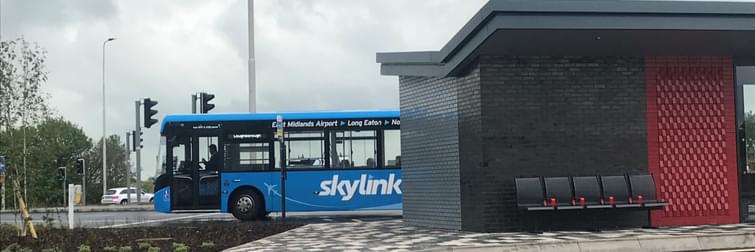
blog: Connecting East Midlands Gateway by sustainable transport
Thursday 20th June 2019
SEGRO Logistics Park East Midlands Gateway is a 700-acre logistics park and a 50-acre rail freight interchange, adjacent to East Midlands Airport. When complete, the site will be a regionally significant employment hub, creating over 7,000 jobs in the logistics and warehousing industry in the East Midlands.
ITP’s role has been to work with the developer, local authorities, bus operators, the airport and occupiers to ensure sustainable transport is an attractive and convenient option for those working at the site to ensure we can achieve a high modal share by car share, bus and active travel.
Where it all began...
In 2012, we joined the multi-disciplinary team of planners, engineers, architects and lawyers in preparing the necessary documents to gain planning consent for the site. Advising on all aspects of sustainable transport, we prepared the Site-Wide Travel Plan and the Public Transport Strategy setting out how employees would be encouraged to car share, catch the bus or use active travel for the commute.
Due to the size and scale of the development, the site was deemed a Nationally Significant Infrastructure Project with approvals overseen by the Planning Inspectorate; and four years after the rigorous applications process started, planning permission was granted in 2016. We were retained as the Site Wide Travel Plan Coordinators and our role evolved from planning to delivery, overseeing the implementation of all sustainable transport measures for the site.
What have we been doing since then?
Ensuring the site is well connected to local labour markets, and informing potential employees about transport options, will be essential to fulfill the ~7,000 job opportunities at the site over the next 10 years. To do this we assembled a Sustainable Transport Working Group comprising of the developer, local authorities, transport operators and the occupiers, to oversee the implementation of the Travel Plan and Public Transport strategy; and to take a strategic view on connecting to nearby towns and cities to ensure that every effort is made to promote sustainable travel and encourage a change in behaviour towards sustainable forms of transport.
Construction
Over the past three years, construction at the site has been rapidly progressing. In addition to the build out of the warehouse units and rail line, significant enhancements have been made to the strategic road network to improve the flow of vehicles around the M1 and the A50 junctions; and a new relief road has been built to connect the A453 to the A6. These necessary improvements to the road network have been paired with investments in sustainable transport infrastructure. Given the site’s location (approx. 13 miles form the nearest city), shared transport will play an important role to ensuring the site is accessible for those employees that do not have access to a private car.
The new EMG bus interchange will serve as a hub for the bus network, providing regular, direct connections to Nottingham, Derby, Loughborough and Leicester. A dedicated liftshare site will enable employees to find a car share partner and and priority car share bays provide preferential parking for those who share their commute to work. For those employees commuting from nearby towns and villages, new shared paths and crossing facilities have been put in place to create safe environments to walk and cycle to the site, this covers not only the East Midlands Gateway site bus also extends into the nearby towns and villages.
At a unit level, each occupier is installing facilities to enable sustainable travel use, this includes electric vehicle charging points, real-time bus information, showers, changing facilities and lockers, bicycle parking and priority car share bays.
Preparing for occupation
The first occupiers moved on-site in April 2019 and four more will follow in the next 12 months. A range of resources have been prepared to ensure employees working at the site are informed about their travel options and to promote the benefits of sustainable travel. This has included:
- A dedicated travel website for East Midlands Gateway
- Printed & digital travel information packs and maps for employees.
- Printed & digital travel information bulletin boards for entrance halls and staff rooms
- Personalised journey plans for new employees
- Practical promotional items for use at employee engagement events.
This engagement with employees will continue, with occupiers cross-promoting site-wide and national sustainable travel campaigns to their employees.
What happens next?
The Sustainable Transport Working Group will be working at a strategic level to determine the long-term ambitions for improving sustainable transport infrastructure, including investments in local public transport services, the potential for bike hire schemes and assessing how new technology could be used to facilitate the efficient movement of people to and within the site.
At an operational level, now that much of the sustainable transport infrastructure is in place we will be turning our attention to the softer side of transport planning – influencing employees' travel behaviour to encourage greater sustainable travel use. Drawing upon a wealth of experience in delivering similar interventions across the East Midlands, we will be working with each occupier to support and advise them on the most effective way to engage with employees on sustainable travel matters to encourage them to leave their cars at home and use the bus, share a ride or (for those living close enough) walk or cycle to work. We will be working with the STWG to provide a range of incentives to help employees make that first step in using sustainable travel, whether that’s a taster bus tickets, signposting to cycle training or personalised travel planning
For more information on the public transport services please click here or for our delivery of sustainable travel initiatives click here.
Like the sound of working on similar types of projects at ITP? We're currently hiring for transport professionals with 8+ years' experience within the Smarter Travel and Development Planning sectors - find out more about the roles and how to apply here.
